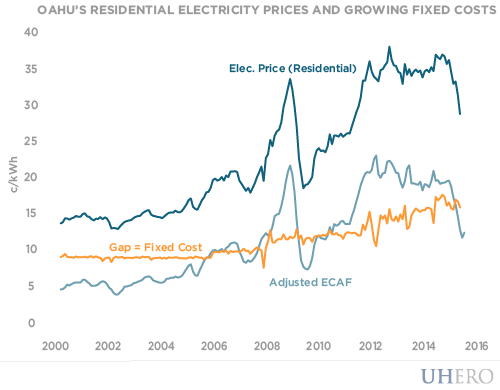By Makena Coffman and Michael Roberts
In Hawaii, like most U.S. states, households installing rooftop solar photovoltaic (PV) systems receive special pricing under net-metering agreements. These agreements allow households with rooftop solar to buy and sell electricity at the retail rate, effectively using the larger grid to store surplus generation from their panels during sunny times and use it when the sun isn’t shining. If a household generates more electricity than it consumes over the course of a month, it obtains a credit that rolls over for use in future months. Net generation supplied to the grid in excess of that consumed over the course of a full year is forfeited to the utility. Net metering agreements often include a monthly fee to support billing, transmission and operation of the grid.
A growing concern is that the utility has many costs besides the fuel used in electricity generation, and most of these “fixed costs” are lumped in with per- kilowatt hour (kWh) charges. As a result, under current net metering agreements, when a solar customer provides their own power, they don’t pay the fixed- cost component for each kWh they produce. Under a revenue-decoupling rule, those costs are shifted to households and businesses without rooftop solar. As less power is sold in Hawaii, fixed costs per kWh are rising fast. Most of the decrease in power sales is due to gains in efficiency, but some of it is due to installations of solar PV. Residential customers now pay roughly $0.17/kWh for fixed costs. After the drop in oil prices earlier this year, well over half the utility’s revenue from residential customers goes toward fixed costs.

A longer-term concern, particularly in Hawaii with its high electricity rates, is that an inefficient pricing system could encourage many households and businesses to install stand-alone systems, unplug from the grid, and further raise costs for everyone else.
In a new report UHERO’s Energy Policy & Planning Group summarizes the benefits and challenges with distributed solar and sketch out a set of long-term solutions based on marginal-cost pricing as the primary platform. Marginal cost is the incremental cost of power production—the cost of generating one more kWh. This cost can vary a lot depending on total demand and the amount of renewable power, among other things, so ideal prices would vary over the course of each day, week, season and year. This is likely to become especially pronounced as the variable supply from renewable sources becomes more prominent.
BLOG POSTS ARE PRELIMINARY MATERIALS CIRCULATED TO STIMULATE DISCUSSION AND CRITICAL COMMENT. THE VIEWS EXPRESSED ARE THOSE OF THE INDIVIDUAL AUTHORS. WHILE BLOG POSTS BENEFIT FROM ACTIVE UHERO DISCUSSION, THEY HAVE NOT UNDERGONE FORMAL ACADEMIC PEER REVIEW.




